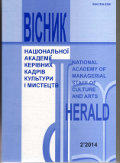SONGBOOKS OF THE UKRAINIANS OF ROMANIA AS A SOURCE OF STUDY OF MODERN FOLKLORE
DOI:
https://doi.org/10.32461/2226-3209.2.2014.137972Keywords:
music folklore, folklore specialists, Ukrainians, collections of songs, songbooks, Diaspora, RomaniaAbstract
In this article we review, characterize and describe the significance of collection of songs and songbooks of the Ukrainians of Romania of the second half of XX century as a source of study of modern folklore. There were distinguished the figures of researchers of regional folklore during the mentioned period, and noted the contribution of folklore specialists into preservation, research and popularization of folk music of the Ukrainian Diaspora inRomania.
Social-political and socio-cultural conditions of existence of Ukrainian people during the last two centuries have caused their mass emigration from native land, change of the status of autochtonal population to marginal national minorities of other countries, including neighbouring Romania. If on theterritoryofMaramuresthe Ukrainians were autochtonal all through the ages, then toBanatand Dobrobuzh they emigrated during different times. Despite of strong assimilation and social-political processes, the Ukrainians inRomaniatill nowadays keep folk poetic works, songs in particular.
History of culture pays attention to complicity and contradictions of modern folk process: on the one hand, it is possible to state gradual reduction of weight and place of traditional folklore in modern life of a person occurring dissimilarly as per type, genre, region, on the other hand – active functioning of many types and genres in non-traditional environment – on the stage and youth centers. Besides, folklore is capable of adaptation with other types of art. Folk process in Ukrainian environment on theterritoryofRomaniareveals all these peculiarities.
Publishing of some Ukrainian folk collected volumes and song books inRomaniais observed in the second half of XX century. Their authors were famous folklorists and regional ethnographers: Ivan Reboshapka, Myroslava Shandru, Oleksa Bevka and others. Publishing process of song books became significantly more active during the first decade of the XXI century. They were published by Oleksa Bevka, Mariia Chubika-Hryhorash. Unfortunately, the collected volumes contain only literary texts. Absence of musical notation in all the above mentioned works renders impossible their deeper music and folklore research, however, they played a big role in preservation and development of song folklore inRomania.
Valuable are those collections that fix attention on both components of a song – literary text and musical notation. These are Christmas carols of Maramures [11], folk songs of Ukrainians of Romania collected and arranged by Ivan Liber [4] and Ivan Khlanta.
Since the places of compact settlement of the Ukrainians inRomaniaborder with Bukovyna, quite natural is attention of researchers to the cultural processes in Ukrainian environment on the both sides of the border. Kuzma Smal (1935-2012) is an example of long-lived experienced folklorist, ethnographic music expert, and composer. In collaboration with Romanian folklorist and ethnologist Ivan Kideshchuk from Suchava were published the song books "Song Treasures of Negostina" [5] and "Bukovyna, My Native Land" [1]. This rich song collection is a valuable source not only for folklorists, but also for ethnographers, art experts, historians. Original records have educational meaning for many admirers of folklore, directors of amateur groups, students.
The most complete publication of songs of the Ukrainians of Banat that has generalizing and summarizing character is a collected volume by Ukrainian researcher from Zakarpattia Ivan Khlanta [3]. The collected materials (several hundreds of songs of different genres and about two thousand of kolomyikas) represent the songs of Zakarpattia as old as hundred years and demonstrate that "song art continues to remain important cultural achievement of the Ukrainians of Banatu that carefully keep traditional song heritage".
Thus, review of published song books of the Ukrainians inRomaniaof the second half of XX century proves existence of the significant set of the collected musical folklore of the region that is represented by different genres and represents vivid figures of folklore mediums. This rich original material has essential significance for study of folklore existence within modern epoch, transmission of folklore tradition, as the recorded literary texts and musical notations and audio records serve as a basis for deep research, comparison of life-style and preservation of genres during the long period of time, use of folklore in the modern concert practice by some performers, groups, choirs and as a source of composers’ creative work. Gathered folklore of one territory, repertoire of some performers – this is that material that helps us to disclose history of folk songs, wealth of its forms, rhythmic, artistic means deeper and well-grounded. The Ukrainians of Romania, despite of circumstances, preserve folk traditions, dialects and songs. Only these aspects can ensure preservation of national minorities in the complicated global XXI century. Thus, the published song books and collections of the Ukrainian folk songs not only present the certain view of existence of these works in modern Ukrainian environment of Romania, but also serve as an important source of comparative folk research and assistant material for enrichment of repertoire of acting artistic groups in Ukraine as well as in Diaspora.
Downloads
Published
Issue
Section
License
Authors who publish with this journal agree to the following terms:
1. Authors retain copyright and grant the journal right of first publication with the work simultaneously licensed under a Creative Commons Attribution License that allows others to share the work with an acknowledgement of the work's authorship and initial publication in this journal.
2. Authors are able to enter into separate, additional contractual arrangements for the non-exclusive distribution of the journal's published version of the work (e.g., post it to an institutional repository or publish it in a book), with an acknowledgement of its initial publication in this journal.
3. Authors are permitted and encouraged to post their work online (e.g., in institutional repositories or on their website) prior to and during the submission process, as it can lead to productive exchanges, as well as earlier and greater citation of published work (See The Effect of Open Access).


